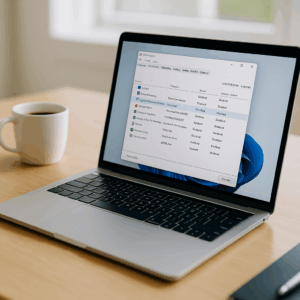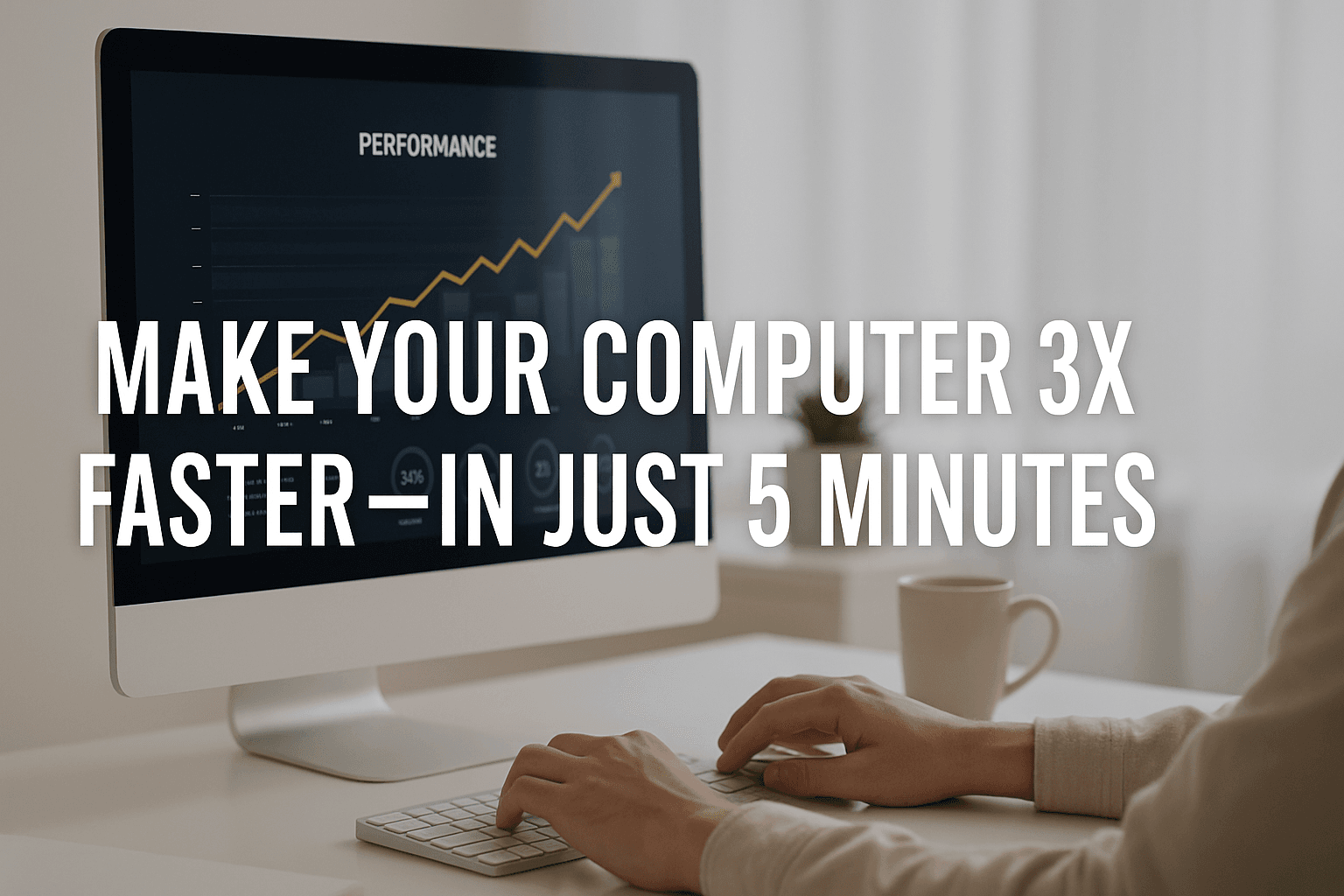If your computer feels slow and unresponsive, you’re not alone.
Every week, I meet people who think they need a new PC — when all they really need are simple optimization steps.
As an IT consultant who’s restored hundreds of systems, I can confidently say this:
You can speed up your computer dramatically with small, strategic tweaks — no expensive upgrades or reinstallation required.
Here are five proven IT tips you can do in five minutes to bring your machine back to life.
A sleek professional desk setup representing faster computer performance and digital productivity.

1️⃣ Clean Startup Programs
When your computer takes forever to boot, it’s not age — it’s bloat.
Dozens of apps secretly launch during startup, eating memory before you even open Chrome.
Fix it fast:
Windows: Press
Ctrl + Shift + Esc→ Startup tab → disable unnecessary appsmacOS: System Settings → Users & Groups → Login Items
Common culprits: Spotify, Dropbox, Zoom, Steam, Discord.
Expert Tip: Disable everything you don’t need on launch. Your PC will boot 2–3x faster immediately.
CCleaner Professional — automates startup optimization safely.
The fewer background apps you load, the more breathing room your system gets.
2️⃣ Clear Temporary Files and Cache
Your computer accumulates digital junk daily — temp files, browser cache, log files.
They slow down indexing, browsing, and even file saving.
Quick fix:
Windows: Press
Windows + R, type%temp%, and delete all files.macOS: Finder → Go → Go to Folder →
~/Library/Caches
Or use trusted utilities like BleachBit or CCleaner for one-click cleanup.
⚙️ Pro Insight: I once cleared 12 GB of old browser cache from a client’s laptop. Their system boot time dropped from 2 minutes to 30 seconds.
3️⃣ Manage Background Processes
Even after startup, your computer quietly runs dozens of background tasks — updaters, sync apps, telemetry services.
They consume CPU and RAM constantly.
How to fix it:
Open Task Manager (Windows) or Activity Monitor (Mac)
Sort by CPU or Memory
End any non-essential processes (avoid system processes)
Do this weekly. It takes two minutes but makes your computer feel brand new again.
🧠 My Opinion: Background process management is the most overlooked performance habit. It’s like closing the windows before you turn on the air conditioner — simple logic most people forget.
4️⃣ Update Drivers and System Software
Old drivers = slow performance + instability.
When your GPU or chipset drivers are outdated, your PC can lag, crash, or overheat.
How to fix it:
Windows: Settings → Windows Update → Check for updates
macOS: System Settings → General → Software Update
🖥️ Example: A single NVIDIA update improved a gaming laptop’s multitasking by 50%.
Updates are like oil changes — invisible, but essential.
5️⃣ Optimize Storage and Enable SSD TRIM
If your computer uses an SSD, TRIM ensures deleted data blocks are properly cleared.
Without it, your SSD slows over time.
Windows:
Open Command Prompt
Type
fsutil behavior query DisableDeleteNotifyIf the result is
0, TRIM is enabled.
Mac: TRIM is automatically active on modern systems.
Also, keep at least 20% of your drive free — full disks slow dramatically.
Samsung Magician SSD Utility — automates TRIM and performance optimization.
⚡ Bonus Tip: Restart More Often
It sounds trivial, but restarting clears RAM leaks and resets system processes.
Reboot once a day if you use your PC heavily.
Think of it as giving your computer a quick nap to restore focus — just like you.
💬 Final Thoughts
Speeding up your computer isn’t magic — it’s maintenance.
In just five minutes, you can reclaim the power and speed you thought you lost years ago.
Computers don’t slow down; we just stop taking care of them.
Treat your system with consistency, and it will reward you with years of smooth performance.
🧩 Final Advice: The same discipline that powers your 10-minute productivity habit applies here. A few intentional minutes each week prevent hours of frustration later.
